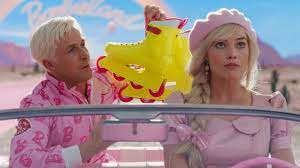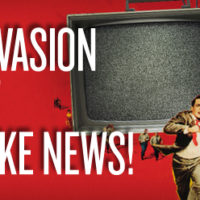

Barbie Serves to Uphold the Very Gender Stereotypes it Strives to Undermine
This is not a movie review. It is a movie commentary. I am not here to tell you whether Greta Gerwig’s new adaptation of Barbie into a major motion picture is good or bad (it’s absolutely fantastic!), but rather to draw on the work to make a larger point about feminist principles. This movie has bigger fish to fry, as do I, and unfortunately so too do the numerous right-wing authoritarians who want to label the film as “woke propaganda” all so that they can advance their own personal agendas.
I went to see Barbie with my 14-year old daughter, herself quite a feminist after my own making. I really didn’t want to go, having severally low expectations for a movie based around a toy, but it was my last day with her this summer before she left with her mom on vacation, so I told her we could do whatever she wanted to do, and this was it. She told me that it had garnered glowing reviews, and I thought perhaps that it would be self-referentially funny, something like the original Lego Movie which also used Will Ferrell as a corporate head figure. But from the opening scene that serves as both an homage to and parody of 2001: A Space Odyssey, I knew this film was going to far exceed my expectations. Not only is the film brilliantly meta and self-aware, it delivers an empowering commentary on gender equity in the 21st century. In so doing, it cleverly exposes the subversive and nuanced nature of how even such seemingly benign facets of our daily lives like childhood toys buttress a patriarchal system that serves to undermine the expectations and opportunities of women in modern society.
And in this regard, it represents the promotion of a feminist ideology that I fully embrace. This is exactly the type of messaging that I have tried to inculcate in my own daughter, one that instils in her and other young women that they are fully capable of doing absolutely anything that a man can do, that they should be and can be anything they want to be. And to no surprise, she loved that about the movie. As we walked to the car afterwards, she asked me how I liked it.
“I thought it was fantastic. But I do have one serious concern about it.”
“What’s, that, Dad?”
“I don’t like the way it portrayed men.”

While this version of Barbie provides a healthy vision of empowerment and autonomy for young women, it does quite the opposite for young men. In the film, men, particularly the various iterations of Ken, are portrayed as stupid, incapable, emotionally stunted, and co-dependent. Ryan Gosling’s depiction of “stereotypical” Ken shows him to be foolish, petulant, immature, needy, and violent. At one point, he suggests that his entire happiness and self-worth is wholly dependent on whether or not Barbie looks at him that day. When Barbie leaves for the Real World and Ken is left to his own devices, Barbieland devolves into a dystopian nightmare that is antithetical to all intellectualism and judgments of taste, eventually regressing to a state of war as the Kens fight amongst themselves for supremacy. The thinly-veiled intimation here is that men are just a bunch of sophomoric children, incapable of leadership or discernment. In repudiating centuries of undermining gender stereotypes of women, this movie ends up engaging in and reinforcing those same types of unfounded stereotypes for men.
Towards the film’s conclusion, Real World mom, Sasha, depicted by America Ferrera, goes on a rant about the plight of typical women in modern society. It is a powerful and deeply accurate encapsulation of all the tight-rope walking so many women must do in order to fit the expectations demanded of them within the various roles they are obligated to fulfil on a daily basis. But where is this same histrionics for the plight of men in contemporary society? Men, too, are the victims of constraining gender expectations, as they struggle to adhere to confined gender prescriptions. While young men are susceptible to the same types of mental health issues that afflict women, they are raised to believe that seeking help is unacceptably weak and as such are twice as likely as women to engage in at-risk behaviours or die by suicide. While women still suffer from a compensation gap when doing the same job, they are more likely to attend university and thus get that job in the first place. By so brilliantly highlighting the perplexity of life for women in modern society without even acknowledging the dilemmas men also face, Gerwig’s Barbie minimizes men and trivialises their circumstances.
When my daughter asked me what I meant about the film’s depiction of men, I said, “Feminism, at its best, doesn’t need to push men down in order to lift women up. In the end, both genders should be liberated from the constraints of societal expectation in order to be free to become the best versions of themselves.” Reversing the gender hierarchy doesn’t topple gender-based discrimination; it just flips it on its head. At the end of the movie, Barbies and Kens don’t evolve into running Barbieland together in a mutually-respectful vision of gender empowerment. The land gets turned back over to Barbies to run, with Kens being put back in their rightful place. This isn’t gender equality any more than the real world is.
And this is what has right-wing reductionists piping off about the movie being “woke” and discriminatory. In some sense, they aren’t wrong. It is a bit of male bashing. But it didn’t have to be. It could have lifted up both men and women and acknowledged how the gender prescriptions we all fall victim to limit the full potential for both. But by garnering such worldwide acclaim, both critically and at the box-office, despite the political backlash, Barbie can serve to remind us where feminism should be taking us: not to a reversal of the gender hierarchy, but rather to its ultimate dissolution altogether.
Steven Craig is the author of the best-selling novel WAITING FOR TODAY, as well as numerous published poems, short stories, and dramatic works. Read his blog TRUTH: In 1000 Words or Less every THURSDAY at www.waitingfortoday.com






